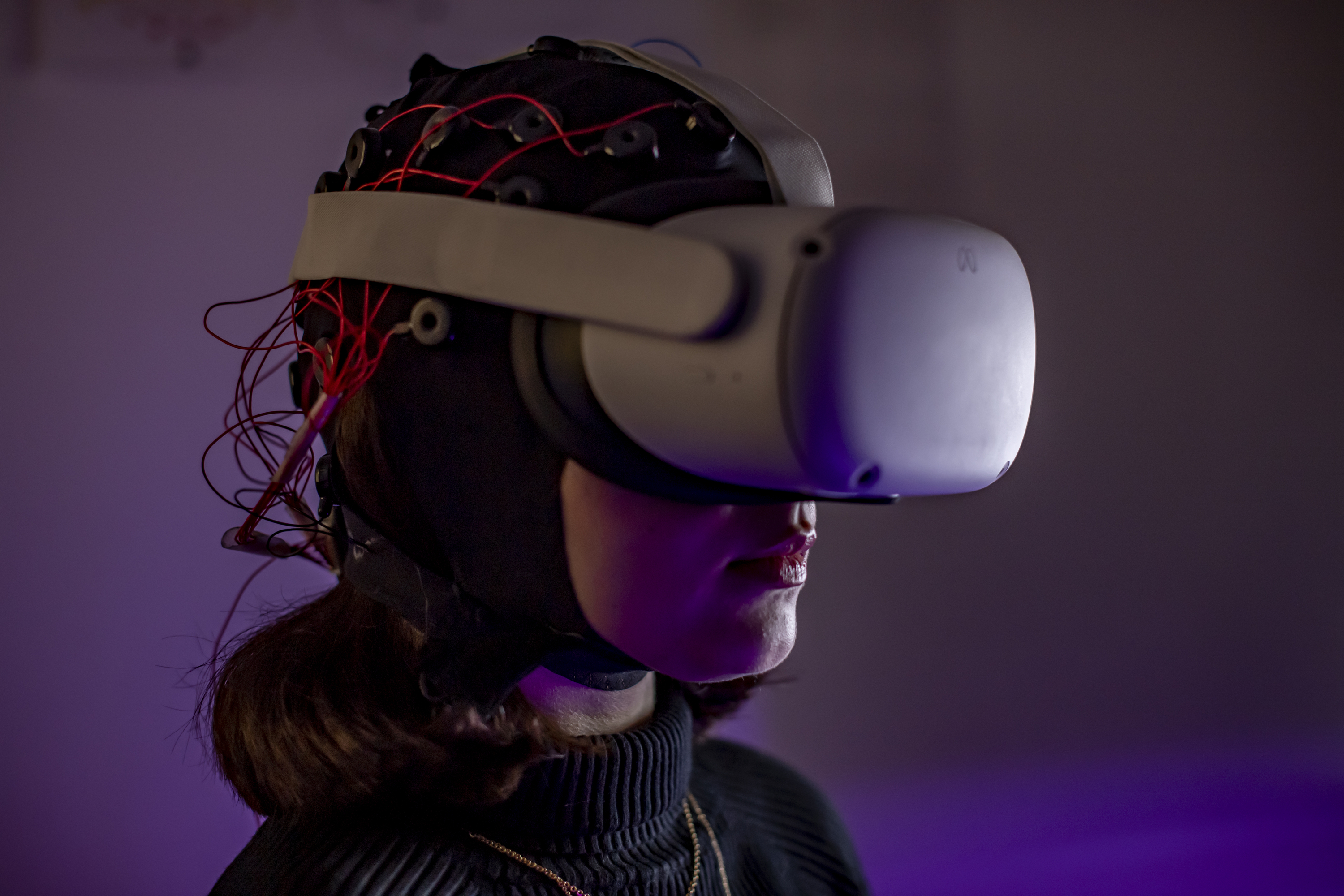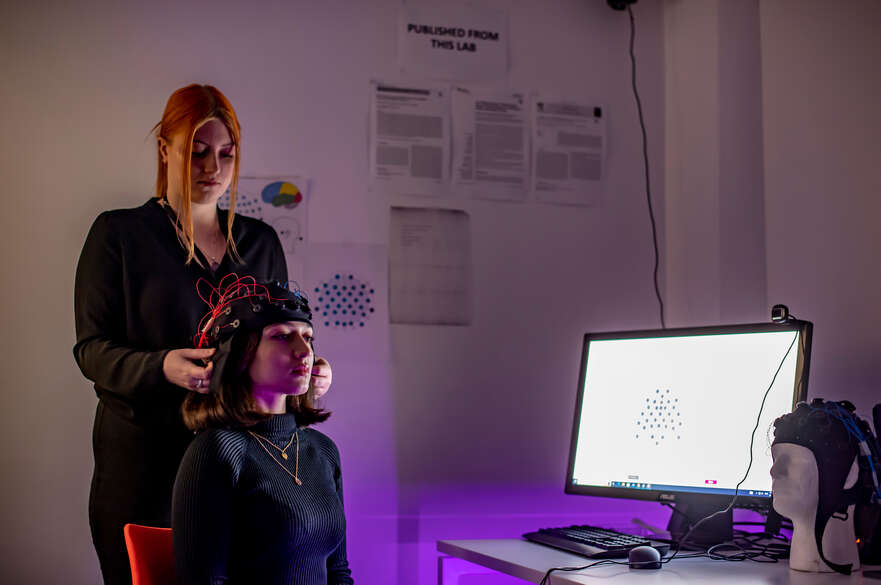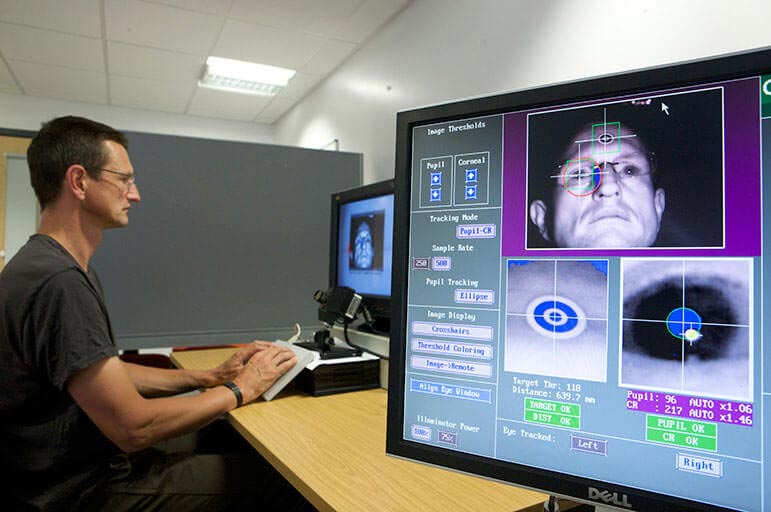Role
Andrew Mackenzie is a Senior Lecturer in the department of Psychology at NTU. Andrew teaches across a number of psychology modules with a focus on cognitive psychology and cognitive neuroscience. He is also the Assessment Team lead within NTU Psychology with a role centred around quality assurance and development for assessment-related activity.
Working within Applied Cognitive Psychology and Cognitive Neuroscience fields, his main research interests focus on exploring performance and expertise. These interests extend from the processes involved in early-level vision through to eye movements in the real world. Working across several domains, including, for example, sport, medicine and transport, he broadly wishes to a) understand the visual and neural process involved in tasks, b) understand the visual and attentional mechanisms that contribute to the individual differences in performance within these tasks and c) where possible, develop diagnostic and training tools to assess and develop skill.
Career overview
Andrew completed his Undergraduate degree in Psychology at the University of Dundee in 2011. He then completed his PhD at the University of St Andrews, under the supervision of Prof Julie Harris, within the areas of applied visual cognition where he investigated eye movements and driving. He then began working at NTU as a researcher in 2015 and was involved in a number of vision and cognitive psychology related projects. He became a Lecturer at NTU in 2017.
Research areas
Andrew’s research focus relates to performance and expertise in everyday settings. He aims to explore the cognitive and neural mechanisms related to individual differences and skill across several domains, such as sport, medicine and transport. For example, using EEG methods to explore the role of posterior alpha frequency in divided attention in sports players, or using eye movement and eye tracking methods to explore the role of joint attention in medical trauma situations. Andrew’s wider goal is to highlight the importance of fitness and sport and its positive (correlative) influence on cognition.
External activity
Andrew is also an experienced and expert user of the statistical computing software R and offers bespoke R training packages for academic colleagues nationally or internationally
Andrew also leads on the Psychology for 15–17-year-olds summer school short course. In this course, we aim to give high school students the opportunity to explore a wide range of applied psychology and to learn important skills, with a further aim to develop psychological and scientific competence ready for starting University.
Publications
Mackenzie, A. K., Baker, J., Daly, R. C., & Howard, C. J. (2024). Peak occipital alpha
frequency mediates the relationship between sporting expertise and multiple object
tracking performance. Brain and Behavior, 14(2), e3434. https://doi.org/10.1002/brb3.3434
Guest, D., Gous, G., Butcher, A., Mackenzie, A.K, Guest, G., Young, A., & Crundall, D.
(2024). Developing a taxonomy of hazards and hazard mitigation strategies for motorised
mobility scooter users. Accident Analysis & Prevention, 195, 107423.
https://doi.org/10.1016/j.aap.2023.107423
Mackenzie, A., Vernon, M., Myers, J., & Hutton, R. J. (2023). The Creation and Validation
of a 360-Degree Video-Based Situation Awareness Training and Assessment Tool for
Trauma Team Leaders. Multimodal Approaches to Healthcare Communication Research:
Visualising Interactions for Resilient Healthcare in the UK and Japan, 159.
Kaye, L. K., MacKenzie, A. K., Rodriguez-Cuadrado, S., Malone, S. A., Stacey, J. E., &
Garrot, E. (2023). (Not) feeling up or down? Lack of evidence for vertical spatial iconicity
effects for valence evaluations of emoji stimuli. Computers in Human Behavior, 149,
107931. https://doi.org/10.1016/j.chb.2023.107931
Cohen, E., Byrom, B., Becher, A., Jörntén-Karlsson, M., & Mackenzie, A. K. (2023).
Comparative effectiveness of econsent: systematic review. Journal of medical Internet
research, 25, e43883. https://doi.org/10.2196/43883
Tsuchiya, K., Coffey, F., Nakamura, K., Mackenzie, A., Atkins, S., Chałupnik, M., ... &
Fuyuno, M. (2022). Action request episodes in trauma team interactions in Japan and the
UK-A multimodal analysis of joint actions in medical simulation. Journal of Pragmatics,
194, 101-118. https://doi.org/10.1016/j.pragma.2022.04.009
Mackenzie, A. K., Vernon, M. L., Cox, P. R., Crundall, D., Daly, R. C., Guest, D., ... &
Howard, C. J. (2022). The Multiple Object Avoidance (MOA) task measures attention for
action: Evidence from driving and sport. Behavior Research Methods, 1-22.
https://doi.org/10.3758/s13428-021-01679-2
Huffman, S., Crundall, D., Smith, H., & Mackenzie, A.K (2022). Situation Awareness in
sports: A scoping review. Psychology of Sport and Exercise, 102132.
https://doi.org/10.1016/j.psychsport.2021.102132
Laxton, V., Mackenzie, A. K., & Crundall, D (2022). An exploration into the contributing
cognitive skills of lifeguard visual search. Applied Cognitive Psychology, 6, 216–227.
https://doi.org/10.1002/acp.3913
Jidong, D. E., Ike, T. J., Tribe, R., Tunariu, A. D., Rohleder, P., & Mackenzie, A.K (2021).
Berom cultural beliefs and attitudes towards mental health problems in Nigeria: a mixed-
methods study. Mental Health, Religion and Culture.
https://doi.org/10.1080/13674676.2021.2019205 (note: Statistical Input only)
Tsuchiya, K., Coffey, F., Mackenzie, A., Atkins, S., Chalupnik, M., Timmons, S., ... &
Crundall, D. (2021) Framing emergency care interactions: A multimodal analysis of team
leaders’ making requests using eye-tracking glasses. Communication and Medicine
https://doi.org/10.1558/cam.18248
Kroll, V., Mackenzie, A. K., Goodge, T., Hill, R., Davies, R., & Crundall, D. (2020).
Creating a hazard-based training and assessment tool for emergency response drivers.
Accident Analysis & Prevention, 144, 105607. https://doi.org/10.1016/j.aap.2020.105607
Nakamura, K., Sakai, T., Abe, T., Saitoh, T., Coffey, F., MacKenzie, A., ... & Tsuchiya, K.
(2020). A team leader’s gaze before and after making requests in emergency care
simulation: a case study with eye-tracking glasses. BMJ Simulation and Technology
Enhanced Learning, bmjstel-2019. https://doi.org/10.1136/bmjstel-2019-000561
Sivakumaran, M.H., Mackenzie, A.K., Callan., I.R., Ainge, J.A., & O’Connor, A.R. (2018).
The Discrimination ration derived from Novel Object Recognition tasks as a measure of
recognition memory sensitivity, not bias. Scientific Reports, 8:11579, DOI:
10.1038/s41598-018-30030-7. https://doi.org/10.1038/s41598-018-30030-7
Young, A.H., Mackenzie A.K., Davies, R. & Crundall, D. (2018). Familiarity breeds
contempt for the road ahead: The real-world effects of route repetition on visual attention
in an expert driver. Transportation Research Part F: Psychology and Behaviour.
https://doi.org/10.1016/j.trf.2017.10.004
Mackenzie, A.K. & Harris, J.M. (2017). A Link Between Attentional function, Effective Eye
Movements and Driving Ability. Journal of Experimental Psychology: Human Perception
and Performance, 43(2), 381-394. https://doi.org/10.1037/xhp0000297
Mackenzie, A.K. & Harris, J.M. (2015). Eye movements and Hazard Perception in Active
and Passive Driving, Visual Cognition, 23(6), 736-757. https://doi.org/10.1080/13506285.2015.1079583
Course(s) I teach on
-
 Undergraduate | Full-time
Undergraduate | Full-timeCOURSE
Psychology - BSc (Hons)
https://www.ntu.ac.uk/course/social-sciences/ug/bsc-hons-psychology
-
 Undergraduate | Full-time / Sandwich
Undergraduate | Full-time / Sandwichhttps://www.ntu.ac.uk/course/social-sciences/ug/bsc-hons-psychology-cognition-and-neuroscience
-
 Postgraduate taught / Postgraduate research | Full-time / Part-time
Postgraduate taught / Postgraduate research | Full-time / Part-timehttps://www.ntu.ac.uk/course/social-sciences/pg/msc-mres-psychological-research-methods
